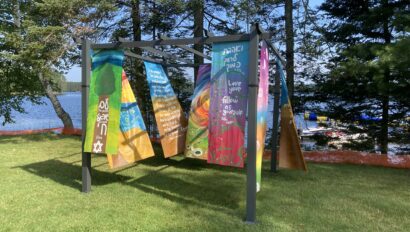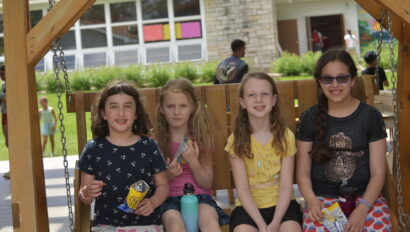I share this week a Ramah-adapted paraphrase of a D’var Torah by one of my favorite teachers, Rabbi Shai Held of Mechon Hadar.
Rabbi Held notes the great irony the Torah presents as the rationale for why God needed to destroy the world with the flood and then made perhaps the most famous promise in all of world literature: that the world would never again be destroyed. In the earliest parts of the narrative of Noah and the flood we read (Genesis 6:5): “The Lord saw how great was man’s wickedness on earth, and how every plan devised by his heart was nothing but evil all the time." Post-deluge, God vows (8:21): "Never again will I doom the earth because of man, since the devisings of man’s heart are evil from his youth.”
So, to re-state: Man’s nature is evil so God has to destroy the world; after its destruction, God promises to never destroy the world again because … man’s nature is evil. (For Rabbi Held’s literary read and compelling parallel that explains away many translations’ attempt to rectify the situation by changing the second verse to read “although the devisings of man’s heart are evil from his youth,” you’ll have to read his original D’var Torah, available here.)
One way to help explain this seeming contradiction is that what has changed during the flood is not our nature as human beings but God’s relationship to us and, more specifically, how God relates to our mortal failings. In addition to highlighting the liberating power of Biblical theology, which embraces a God in relationship to history and humanity and who can change God’s mind and develop in relationships with individuals, groups, and the universe as a whole, this suggestion also provides a bedrock principle of education and caring for children that Ramah embodies.
The holistic environment of camp means that everyone, from our youngest campers to our most veteran staff, can be themselves. And each of us is, well, human. Our humanity – insights, quirks, foibles, habits – is many things, from funny and endearing to, occasionally, annoying. In fact, that which we love and adore most about cherished family and friends can shift, without warning, to habits that are not as loveable. An example from my own experience: the playfulness of a toddler so endearing at 5 p.m. can be so trying a few hours later during the throes of bedtime resistance. And this, Rabbi Held suggests (in different words), is exactly the lesson of God’s relationship to humanity as stated in the story of Noah.
Sharing living spaces, bathrooms, and tables, our counselors and campers get to know each other very well. Sometimes, through events of far less impact than a world-destroying flood, that which frustrates us about someone else and the reason why we adore them are one and the same, separated by a few minutes, slightly altered settings, or perspective. Being able to see our campers in all their dimensions, from early in the morning to late at night, over the course of an entire summer, allows us to help them discover themselves and grow into the talented Jewish adults they are destined to become. Ramah, at its best, provides a warts-and-all portrait of our humanity: and that portrait appears, both in the moment and when reflecting back, as beautiful as a rainbow above the kikar after a passing July rain shower or as reassuring as rainbows must have been to Noah and his children for the rest of their lives.
Rabbi Held notes the great irony the Torah presents as the rationale for why God needed to destroy the world with the flood and then made perhaps the most famous promise in all of world literature: that the world would never again be destroyed. In the earliest parts of the narrative of Noah and the flood we read (Genesis 6:5): “The Lord saw how great was man’s wickedness on earth, and how every plan devised by his heart was nothing but evil all the time." Post-deluge, God vows (8:21): "Never again will I doom the earth because of man, since the devisings of man’s heart are evil from his youth.”
So, to re-state: Man’s nature is evil so God has to destroy the world; after its destruction, God promises to never destroy the world again because … man’s nature is evil. (For Rabbi Held’s literary read and compelling parallel that explains away many translations’ attempt to rectify the situation by changing the second verse to read “although the devisings of man’s heart are evil from his youth,” you’ll have to read his original D’var Torah, available here.)
One way to help explain this seeming contradiction is that what has changed during the flood is not our nature as human beings but God’s relationship to us and, more specifically, how God relates to our mortal failings. In addition to highlighting the liberating power of Biblical theology, which embraces a God in relationship to history and humanity and who can change God’s mind and develop in relationships with individuals, groups, and the universe as a whole, this suggestion also provides a bedrock principle of education and caring for children that Ramah embodies.
The holistic environment of camp means that everyone, from our youngest campers to our most veteran staff, can be themselves. And each of us is, well, human. Our humanity – insights, quirks, foibles, habits – is many things, from funny and endearing to, occasionally, annoying. In fact, that which we love and adore most about cherished family and friends can shift, without warning, to habits that are not as loveable. An example from my own experience: the playfulness of a toddler so endearing at 5 p.m. can be so trying a few hours later during the throes of bedtime resistance. And this, Rabbi Held suggests (in different words), is exactly the lesson of God’s relationship to humanity as stated in the story of Noah.
Sharing living spaces, bathrooms, and tables, our counselors and campers get to know each other very well. Sometimes, through events of far less impact than a world-destroying flood, that which frustrates us about someone else and the reason why we adore them are one and the same, separated by a few minutes, slightly altered settings, or perspective. Being able to see our campers in all their dimensions, from early in the morning to late at night, over the course of an entire summer, allows us to help them discover themselves and grow into the talented Jewish adults they are destined to become. Ramah, at its best, provides a warts-and-all portrait of our humanity: and that portrait appears, both in the moment and when reflecting back, as beautiful as a rainbow above the kikar after a passing July rain shower or as reassuring as rainbows must have been to Noah and his children for the rest of their lives.





